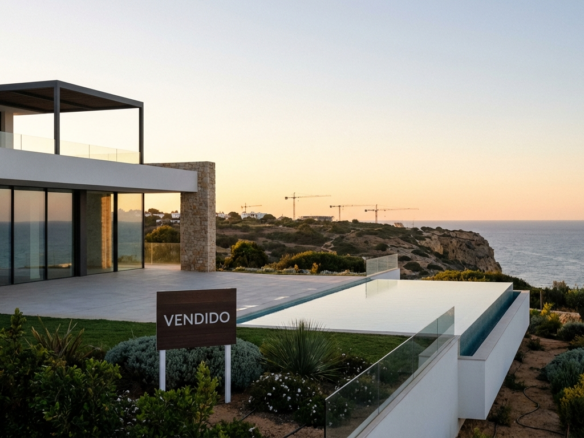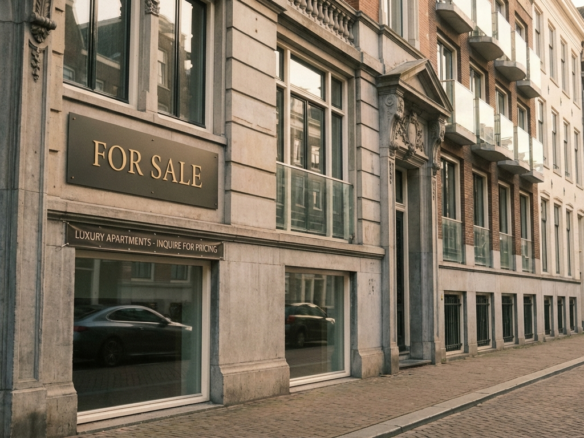The Dutch housing market in 2025 has reached a critical tipping point for single home buyers, with new data revealing that solo first-time buyers now need an astronomical €272,000 in savings to enter the property market. This staggering figure represents a seismic shift in housing affordability, effectively pricing out entire demographics from homeownership and reshaping the fundamental landscape of Dutch real estate.
Get 50% OFF!
Subscribe to our newsletter and enjoy a 50% discount on all listing packages, no strings attached!

The €272K savings requirement stems from the growing gap between maximum mortgage eligibility for single applicants and actual property prices across the Netherlands. As housing costs continue their relentless climb, single buyers find themselves caught in an impossible financial squeeze that demands unprecedented levels of personal wealth accumulation before they can even consider purchasing their first home.
Single Buyers Face €272K Savings Hurdle in 2025
Single home buyers in the Netherlands are confronting an unprecedented financial barrier as the 2025 housing market demands €272,000 in personal savings for property purchases. This massive savings requirement has emerged as the primary obstacle preventing solo first-time buyers from entering the housing market, creating a wealth threshold that excludes vast numbers of potential homeowners from property ownership.
The €272K figure represents the gap between what single buyers can borrow through traditional mortgage products and the actual cost of available properties in today’s market. Unlike couples who can combine their incomes to secure larger mortgages, single applicants face strict lending limits based on individual income multiples, forcing them to bridge the difference through substantial personal savings that most working professionals simply cannot accumulate.
Housing Prices Lock Out Solo First-Time Buyers
The Dutch housing market has evolved into a two-tier system where coupled buyers maintain reasonable access to homeownership while single buyers face systematic exclusion from property purchases. Current market dynamics show that solo applicants encounter mortgage caps that fall dramatically short of average property values, creating an insurmountable financing gap that effectively locks them out of homeownership regardless of their income stability or career prospects.
Property prices across Dutch municipalities have risen to levels where single-income households cannot secure adequate financing through conventional mortgage products alone. This pricing structure has fundamentally altered the demographic composition of home buyers, with single professionals increasingly relegated to permanent rental arrangements despite having stable employment and strong credit profiles that would have qualified them for homeownership in previous market cycles.
€272.000 Cash Requirement Hits Market Starters
First-time buyers entering the 2025 property market face a cash requirement of €272,000 that represents years or even decades of savings accumulation for typical Dutch workers. This enormous upfront cost has transformed homeownership from an achievable milestone for working professionals into a privilege reserved for those with substantial inherited wealth or exceptionally high-earning careers.
The €272K threshold creates a stark divide between market participants, separating those who can access property ownership through family wealth from those dependent solely on personal income and savings. Market starters without access to family financial support find themselves in an impossible position where even aggressive saving strategies cannot generate the required capital within reasonable timeframes, effectively extending their exclusion from homeownership indefinitely.
Mortgage Gap Forces Massive Savings for Singles
The structural mortgage gap affecting single buyers has widened to proportions that demand massive personal savings to bridge the financing shortfall. Current lending practices limit single applicants to mortgage amounts that cover only a fraction of typical property values, forcing them to compensate through personal wealth accumulation that exceeds the annual salaries of most Dutch workers.
Mortgage lenders maintain strict income-to-loan ratios that work reasonably well for dual-income households but create insurmountable barriers for single applicants seeking property ownership. The resulting financing gap has grown so substantial that single buyers must essentially purchase properties with significant cash components, transforming the home buying process from a mortgage-dependent transaction into a wealth-dependent acquisition that excludes middle-income earners from participation.
2025 Property Market Creates €272K Entry Barrier
The 2025 Dutch property market has established a €272.000 entry barrier that fundamentally reshapes access to homeownership across different demographic groups. This financial threshold represents more than just a high down payment; it constitutes a complete restructuring of property ownership patterns that favors wealth accumulation over income earning as the primary qualification for home buying.
Market conditions in 2025 have created an environment where property ownership increasingly correlates with existing wealth rather than current earning capacity or future income potential. The €272K requirement effectively filters potential buyers based on their ability to accumulate substantial cash reserves, creating a property market that serves established wealth holders while systematically excluding working professionals who lack access to significant financial resources beyond their regular employment income.
The €272.000 savings requirement for single home buyers in 2025 represents more than just a market challenge; it signals a fundamental transformation in Dutch property ownership patterns that threatens to create permanent housing inequality. This massive financial barrier effectively excludes entire demographic groups from homeownership, potentially reshaping Dutch society along wealth-based lines that could persist for generations.
As the gap between mortgage accessibility and property prices continues to widen, single buyers face an increasingly impossible choice between accepting permanent rental status or pursuing homeownership goals that may require decades of savings accumulation. The 2025 housing market has created conditions where property ownership becomes a privilege of existing wealth rather than an achievable goal for working professionals, fundamentally altering the social and economic fabric of Dutch housing patterns.





Join The Discussion